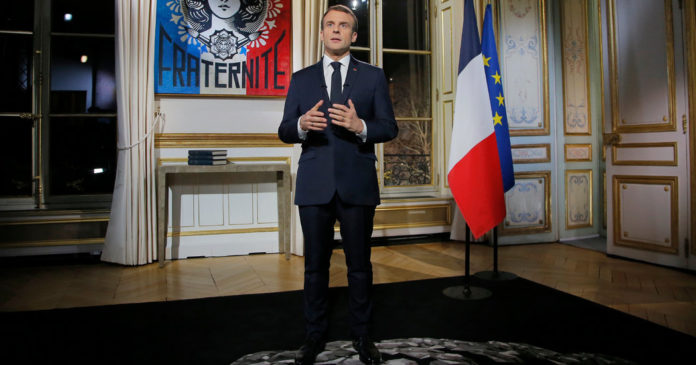PARIS — A French president struggling to reassert his grip after weeks of violent demonstrations across the country assured citizens on Monday night that he understood their anger — but said that henceforth order would be “applied without compromise.”
In a potentially pivotal moment of his presidency, Emmanuel Macron sought to calm a country shaken by over six weeks of unrest, in which wealthy neighborhoods of Paris have been repeatedly hit by looting and burning.
Mr. Macron, in the traditional New Year’s Eve speech given by French presidents, alternated between admonition and conciliation. But his overall message for the “Yellow Vest” protesters behind the demonstrations was unmistakable: Curb the disorder.
“I’ve seen and heard unthinkable, unacceptable things,” Mr. Macron said.
He vowed to “ensure everyone of their rights” but also to “expect from them their duties.”
The president offered an unsparing, if broad, assessment of the protest movement, saying that some “take as a pretext that they are speaking in the name of the people” when “in fact they are merely speaking for a hateful mob that takes after elected officials, the police, journalists, Jews, foreigners, homosexuals.”
“This is quite simply the negation of France,” Mr. Macron said.
He was referring to some extremist rhetoric that has emerged most recently on the fringes of the Yellow Vest movement, which began as a citizen revolt over a rise in gasoline taxes, then spread quickly all over France as it encompassed general anger over economic inequality and a heavy fiscal burden.
In its latest stages, the protests have veered on the fringes into hate-filled rhetoric.
Mr. Macron’s tone on Monday was true to form — he has been accused of being didactic — and it was uncertain if his words would be enough to calm a country that is seeing some of the greatest expressions of popular anger in 50 years.
Mr. Macron said the anger “had come from far back,” suggesting that it had started well before the beginning of his presidency in 2017. Yet while a big tax burden has been a feature of French life for several decades, Mr. Macron himself has become a symbol of economic inequality for many of the protesters.
Early in his presidency, he enacted measures (mostly symbolic) to lighten the tax load on the wealthy and employers, while ratcheting up the burden (again symbolically) on the less well-to-do, including retirees on state pensions.
He was quickly tagged as the “President of the Rich,” a label he has been unable to shake. On some of France’s traffic roundabouts, where the Yellow Vests held sway for much of November and December, mock guillotines were erected with Mr. Macron’s effigy.
Mr. Macron appeared to briefly put himself on the side of the protesters, declaring at the outset that the lesson of the Yellow Vest movement — he was careful not to name it — was that “we are not resigned,” seemingly identifying with the pugnacity of the protesters. He reminded his audience that he too grew up “in the provinces,” though he quickly escaped for Paris’s glittering prizes.
The political opposition was quick Monday to criticize the French president, saying he had failed to shake what it said was the lack of empathy that has gotten him into trouble with French voters before. Critics noted the return of characteristic Macron refrains: “dignity,” “respect,” “vision,” “replacing man at the center of the contemporary project.”
Mr. Macron is fond of such propositions, but they do him no favors with rank-and-file voters in deep France.
An opinion survey released Monday by Harris Interactive found Mr. Macron at a low point in his presidency, with only 31 percent expressing confidence in him.
With the balance of power between the angry street and the country’s shaken institutions thrown into question, Mr. Macron faced a challenge Monday to reassert authority. Clearly he was at pains to do so.
Unusually, he stood up during the entire 16-minute speech, in contrast to his usual seated posture behind a gilded and ornate desk in the Élysée Palace. And unlike in a speech three weeks ago at the height of the crisis, Mr. Macron spoke calmly Monday, with self-assurance.
In the earlier speech, appearing near desperation, a haggard-looking Mr. Macron promised a quick infusion of 10 billion euros to satisfy Yellow Vest demands, including an increase in the minimum wage and an easing of the tax burden on pensioners.
On Monday, Mr. Macron appeared less inclined to give in to the street.
He advised his fellow citizens to “accept reality” in France, and to bear in mind the country’s excellent infrastructure, near free schools and quality medical care.
“Let’s stop thinking ill of ourselves, or to believe that France would be a country where solidarity doesn’t exist, where one always has to spend more,” Mr. Macron said, using the broad-brush concept — solidarity — the French use to designate their generous array of social benefits.
Mr. Macron’s government is placing some hope on a “national debate” in the coming months, an organized series of government-led citizen forums it hopes will allow the Yellow Vests to vent their demands and frustrations.
So far the reaction has been distinctly lukewarm — as were the early responses to Mr. Macron’s speech Monday night.
“This president is an impostor,” the far-right leader Marine Le Pen said on Twitter.
“As usual, his tone was that of a giver of lessons,” the leading far-left parliamentary deputy Adrien Quatennens told the French television channel BFM-TV.
“The tone was pretty martial,” he said, “And I think it will simply reinforce the mobilization.”
Source : Nytimes













